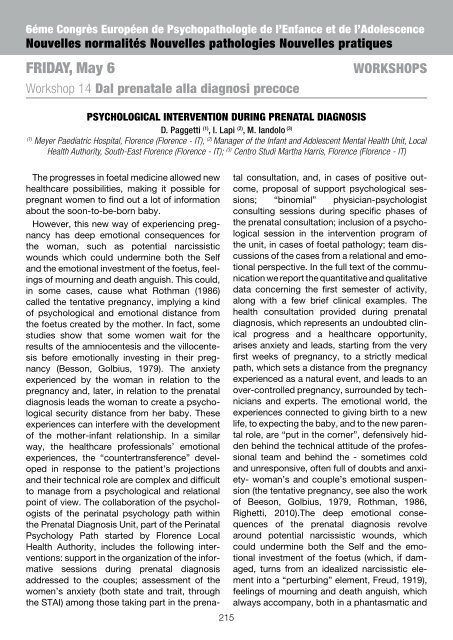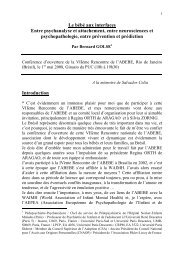Nouvelles normalités Nouvelles pathologies Nouvelles ... - Psynem
Nouvelles normalités Nouvelles pathologies Nouvelles ... - Psynem
Nouvelles normalités Nouvelles pathologies Nouvelles ... - Psynem
Create successful ePaper yourself
Turn your PDF publications into a flip-book with our unique Google optimized e-Paper software.
6° 6éme Congresso Congrès Européen Europeo de di Psicopatologia Psychopathologie dell’Infanzia de l’Enfance e et dell’Adolescenza<br />
de l’Adolescence<br />
Nuove <strong>Nouvelles</strong> normalità <strong>normalités</strong> Nuove <strong>Nouvelles</strong> patologie <strong>pathologies</strong> Nuove pratiche <strong>Nouvelles</strong> pratiques<br />
FRIDAY, May 6 WORKSHOPS<br />
Workshop 14 Dal prenatale alla diagnosi precoce<br />
PSYCHOLOGICAL INTERVENTION DURING PRENATAL DIAGNOSIS<br />
D. Paggetti (1) , I. Lapi (2) , M. Iandolo (3)<br />
(1) Meyer Paediatric Hospital, Florence (Florence - IT), (2) Manager of the Infant and Adolescent Mental Health Unit, Local<br />
Health Authority, South-East Florence (Florence - IT); (3) Centro Studi Martha Harris, Florence (Florence - IT)<br />
The progresses in foetal medicine allowed new<br />
healthcare possibilities, making it possible for<br />
pregnant women to find out a lot of information<br />
about the soon-to-be-born baby.<br />
However, this new way of experiencing pregnancy<br />
has deep emotional consequences for<br />
the woman, such as potential narcissistic<br />
wounds which could undermine both the Self<br />
and the emotional investment of the foetus, feelings<br />
of mourning and death anguish. This could,<br />
in some cases, cause what Rothman (1986)<br />
called the tentative pregnancy, implying a kind<br />
of psychological and emotional distance from<br />
the foetus created by the mother. In fact, some<br />
studies show that some women wait for the<br />
results of the amniocentesis and the villocentesis<br />
before emotionally investing in their pregnancy<br />
(Besson, Golbius, 1979). The anxiety<br />
experienced by the woman in relation to the<br />
pregnancy and, later, in relation to the prenatal<br />
diagnosis leads the woman to create a psychological<br />
security distance from her baby. These<br />
experiences can interfere with the development<br />
of the mother-infant relationship. In a similar<br />
way, the healthcare professionals’ emotional<br />
experiences, the “countertransference” developed<br />
in response to the patient’s projections<br />
and their technical role are complex and difficult<br />
to manage from a psychological and relational<br />
point of view. The collaboration of the psychologists<br />
of the perinatal psychology path within<br />
the Prenatal Diagnosis Unit, part of the Perinatal<br />
Psychology Path started by Florence Local<br />
Health Authority, includes the following interventions:<br />
support in the organization of the informative<br />
sessions during prenatal diagnosis<br />
addressed to the couples; assessment of the<br />
women’s anxiety (both state and trait, through<br />
the STAI) among those taking part in the prena-<br />
215<br />
tal consultation, and, in cases of positive outcome,<br />
proposal of support psychological sessions;<br />
“binomial” physician-psychologist<br />
consulting sessions during specific phases of<br />
the prenatal consultation; inclusion of a psychological<br />
session in the intervention program of<br />
the unit, in cases of foetal pathology; team discussions<br />
of the cases from a relational and emotional<br />
perspective. In the full text of the communication<br />
we report the quantitative and qualitative<br />
data concerning the first semester of activity,<br />
along with a few brief clinical examples. The<br />
health consultation provided during prenatal<br />
diagnosis, which represents an undoubted clinical<br />
progress and a healthcare opportunity,<br />
arises anxiety and leads, starting from the very<br />
first weeks of pregnancy, to a strictly medical<br />
path, which sets a distance from the pregnancy<br />
experienced as a natural event, and leads to an<br />
over-controlled pregnancy, surrounded by technicians<br />
and experts. The emotional world, the<br />
experiences connected to giving birth to a new<br />
life, to expecting the baby, and to the new parental<br />
role, are “put in the corner”, defensively hidden<br />
behind the technical attitude of the professional<br />
team and behind the - sometimes cold<br />
and unresponsive, often full of doubts and anxiety-<br />
woman’s and couple’s emotional suspension<br />
(the tentative pregnancy, see also the work<br />
of Beeson, Golbius, 1979, Rothman, 1986,<br />
Righetti, 2010).The deep emotional consequences<br />
of the prenatal diagnosis revolve<br />
around potential narcissistic wounds, which<br />
could undermine both the Self and the emotional<br />
investment of the foetus (which, if damaged,<br />
turns from an idealized narcissistic element<br />
into a “perturbing” element, Freud, 1919),<br />
feelings of mourning and death anguish, which<br />
always accompany, both in a phantasmatic and



